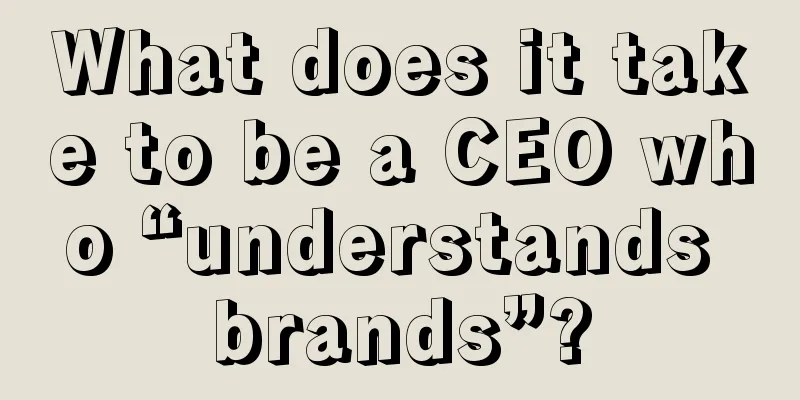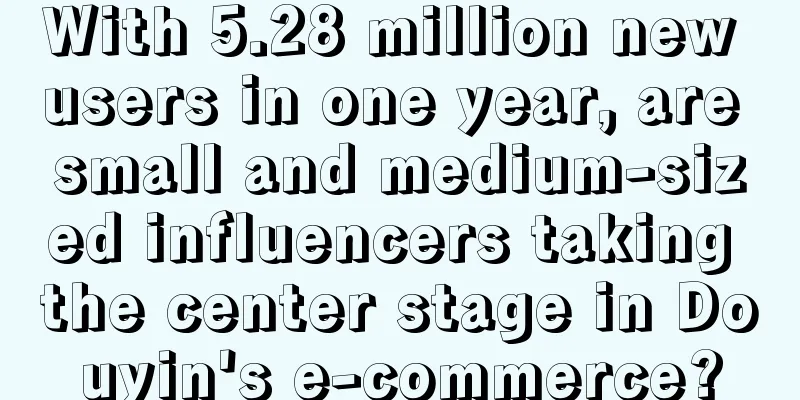The relationship between phenomenal IP and enterprises

In the past two days, Dong Yuhui's affairs have been a hot topic. Netizens, including those in the investment circle, entrepreneurs, and workers, have been discussing it and put forward their own views from different angles. for example: In the investment circle, some people believe that the reliance on phenomenal IPs should be reduced, as over-reliance on a certain IP is not conducive to the long-term development of the company. Entrepreneurs also agree with this, and some people also think that in the stock market, it is a good thing to have an IP that can attract external traffic, and the company only needs to do a good job in operation. Ordinary people believe that an IP can save a company, but if they try to "go global" right after a difficult time, it will inevitably look a bit ugly. I have some feelings about the whole incident. But from a social perspective, in this discussion about the relationship between super IP and companies, the conclusion we have seen so far is that the minority obeys the majority. The phenomenal IP has returned to the company, and whether it will continue to be "de-Dong Xinized" in the future is another matter. With video media and public sentiment spreading so quickly today, I wonder if you have noticed that organizational relationships, the relationship between IP and companies, and even brand value and social responsibility are all undergoing some subtle changes. 01What are the changes? Let’s analyze it from the perspective of people, goods and places. In TOC type companies and traditional sales models, organizational relationships are mainly built around goods and markets. For example, if you have a product, you can open a store on an e-commerce platform and expand the market through offline regional hierarchical relationships. In this model, goods and scenes are the dominant factors in the people, goods and places. However, with the development of mobile Internet, especially the shift of media from pictures and texts to videos, the composition of people, goods and places has changed significantly. Now, people have become the front end of the driving force. This change has led to the transformation of product sales from basic price competition and brand competition to "information and emotional value" competition. Therefore, the organizational structure also changed accordingly, from the original group of people serving a store to a group of people surrounding a few super individuals, the so-called "people bring goods" model. This shift shows that personal influence and appeal are slowly becoming one of the key factors for business success; throughout the process, personal brand building and dissemination have become particularly important, while the traditional roles of products and markets have become relatively secondary. So, once the organization changes, it means that the relationship between IP and the company is also being reshaped. In the past, the relationship between individuals and companies was one of employment. When people bring goods, the platform gives individuals a lot of opportunity costs. When a person becomes popular, the relationship with the company may change. It is not as simple as the boss paying the IP salary, but more like a new type of partner. Why? People not only pay attention to the product itself, but also pay more attention to how the anchor sells the product, his personality and style. For example, the same brand is sold for 50 yuan by other companies, but for 55 yuan by a certain anchor. The anchor patiently explains the product to the user, and others are willing to spend 5 yuan more to buy it. This is the power of information. Although fans have not formed a deep bond with the anchor, there is a subtle change here: fans are willing to pay more for anchors who can provide additional value and unique experiences. All these phenomena reflect the changes in the host’s personal brand influence and the market. Here are some examples: When Simba and Xiao Yangge promote products, some say they are expensive, some say they are good value for money, and some people hold different opinions on style and personal qualities. However, it is undeniable that both of them have won a group of loyal users through their unique style. Even if the price of the products is higher than the market price, users will still buy them. Me too. It snowed in the north recently, and I bought several down jackets from Mr. Dong's live broadcast room as gifts for my parents. I often watch his live broadcasts, and he talks about the products in detail, as well as other aspects, which makes me feel that he is trustworthy. If I change to another anchor, even if the price is the same, I will not decide to buy so easily. The same is true for Lao Luo and some other anchors. I believe you have had such feelings. To put it bluntly, we are buying the personality traits of IP rather than providing information services. 02Personality traits are fixed characteristics of a person. These characteristics make you think that he is different from others, just like some people are particularly humorous, while others are gentle and elegant. Traits are also reflected in brands. In the 1950s, it was popular in American marketing circles to give brands a "prototypical personality". In China, influenced by Pearson, some people call it "brand personality." This is different from the brand personality theory created by Jennifer Aaker, the originator of brand assets and daughter of the famous brand guru Aaker. That school of personality is based on the "Big Five Personality" theory, rather than Jung's collective unconscious and archetypes, and later gradually evolved into 12 types. Why mention it? Because each archetype represents a certain yearning deep in people's hearts; in the human subconscious, the archetype is a universal pattern that is deeply rooted in human culture and psychology. They are imprinted with ideals, dreams, values and expectations for life. When phenomenal IPs and brands have specific prototypes, they actually touch upon the common and deep emotions and desires of the public. For example: Li Ziqi and Zhou Dongyu belong to the prototype of "innocents". The British poet Auden once divided the world's people into two categories: one is the Utopian believers who believe that there will be a beautiful world in the future; the other is the Garden of Eden believers who believe that the world was once perfect. Both types of people have some common characteristics, such as kindness, morality and simplicity, which are the archetypal characteristics of the "innocent". Moreover, the "innocent" will give people a sense of cuteness and cuteness, which is their most easily recognizable feature. Among the brands, Heytea, Perfect Diary, Three Squirrels, Coca-Cola, McDonald's, and Disney all have this "innocent" archetype. Speaking of Zhang Qian, Xu Xiake and Wang Shi, there is a shadow of explorers in all three of them; Zhang Qian went to foreign countries as an envoy of the Han Dynasty, and Xu Xiake traveled around and recorded geography in the Ming Dynasty. Although Wang Shi is a modern entrepreneur, after half a lifetime of experience, it seems that he is always labeled as "the world is so big, I have to go see it." Of course, there are many similar brands, such as Starbucks, JEEP, Sony Walkman, and Levi's, which belong to the explorer prototype. Mr. Yu Minhong, wherever he goes, he carries the labels of educator and entrepreneur. Education can be regarded as the archetype of wise men, usually associated with scholars, experts, philosophers, consultants, teachers, etc. Similar brands include Zhihu, Douban, McKinsey and Ogilvy. The ruler archetype, whose identity label is associated with business owners, leaders, and capitalists, shows the characteristics of striving for and maintaining maximum power. The combination of the two enables them to remain stable and highly predictable in the face of chaos and challenges. A more appropriate expression is "wise leader". Let’s look at Dong Yuhui again. He has mentioned his personal background in many public occasions. He comes from an ordinary rural family with poor conditions. He has an older sister and two younger brothers. His study was very difficult. There was only one primary school in his hometown, and it was half collapsed. I encountered many difficulties when learning English, but eventually I was admitted to Xi'an International Studies University through hard work. After graduation, I joined New Oriental and became an English teacher, realizing my dream. There are two distinct labels for him: "mortal" and "wise man". The mortal archetype represents ordinary people and passers-by. Dong Yuhui loves literary works. He has recommended "Ordinary World", "To Live", "The Moon and Sixpence", and "The Right Bank of the Ergun River" many times in the live broadcast room. He often talks about "compassion", which he believes is one of the most beautiful qualities of human beings. He emphasizes that people with compassion will pay attention to the people around them, try to help them through difficulties, and give them care and support. Even though Dong Yuhui became rich, he still remained low-key at heart. For "rulers", appearance is a symbol of status, but for "mortals", integrating into the crowd and arousing emotional resonance are their characteristics, and appearance is more of a way to establish interpersonal relationships. When the two archetypes of "mortal" and "wise man" are combined together, the content output through the Internet will inevitably arouse strong empathy. However, the disadvantages of wise men are also quite obvious. One of the most typical ones is "Avoidant Personality Disorder". Such people are afraid of rejection from others, extremely sensitive to criticism, and unwilling to have conflicts. So, what happens when an “ordinary wise man” with an avoidant personality meets a “wise man and ruler”? The situation is a bit like a timid child meeting a bold class monitor; mortal wise men desire to establish connections and recognition from others, but they are afraid of being rejected, criticized, and accused of not being unified in their knowledge and actions; therefore, when dealing with others, they often overthink, hesitate, and dare not let go. However, when you meet someone who is a combination of the archetypes of the wise man and the ruler, like a leader who is confident, sticks to his word, is flexible and has strong opinions; in this case, the former will feel that he is being guided and led, while the latter will happen to get what he wants in the process. You might think of it as a kind of ability to control people. To me, it's more like a clash of personalities. In this kind of interaction, the former will learn how to overcome inner hesitation and become more confident and decisive, while the latter may be inspired by the deep thinking and inner wisdom of the "mortal wise men" and learn more about the importance of patience and understanding. 03So, what exactly are people supporting when they support Dong Yuhui? In 1992, American communication scholar Henry Jenkins published a book on fan culture called "Textual Poachers: Television Fans and Participatory Culture." The book mentions that fans of movies and TV series in the late 1980s and early 1990s were not just passive audiences, they were also people who actively participated in culture and were creators. Jenkins called these people "text poachers." This means that they extract materials from TV shows and movies, then add their own interpretations and creativity to create new content, express their own stories and wishes, and shape their culture and social identity. In my opinion, everyone is more like a group of poachers at the moment. Dong Yuhui once said, "I have a face like a terracotta warrior, I am ugly and short, I don't know why you like me." But he provides people with the most important thing: information value. The value of information refers to how useful the information itself is to us. For example, it can teach us knowledge, give us insights, or simply entertain us. Like Dong Yuhui, he shares his personal experiences and insights, which just provides everyone with knowledge value. When everyone actively participates like "text poachers" and creates their own content, they are invisibly expanding the influence of the IP. Every time everyone discusses, redoes, and shares, it's like re-empowering the IP. This kind of subtle contribution makes an IP not only an input, but also a manifestation of a certain kind of broad culture, and its value is therefore amplified. Therefore, many media have said in the past few days that Dong Yuhui's value has been underestimated and that Mr. Yu Minhong needs to re-examine his value. Leaving aside the factors of internal workplace struggles, and observing the phenomenal IPs that once had unpleasant experiences with companies, we can see that the core of these conflicts is that the internal prototypes are magnified by fans, thus creating friction with the values of the company's "ruler" prototype. Friction is not the original intention of the phenomenal IP, but is the result projected by "text poachers", reflecting the differences in concepts and behaviors between IP and managers. To put it bluntly, IP has become a substitute satisfaction for a group of people. Everyone sees the ideal world through IP and magnifies their own desires. Like: Some people believe that in a football match, a team cannot rely solely on one player to score goals. If he gets injured or is in poor form, the performance of the entire team will be affected. Some people hold a different stance. Similarly, when people support Dong Yuhui, they are actually looking for a resonance and reflecting their personal views on the way the "rulers" do things. In the process, people not only support Dong Yuhui's IP, but also reflect on the existing system through him and pursue their personal ideals. This support shows that people's desire for equality, humane management methods, and those who want to shine through their hard work should not be weakened. 04It is worth noting that when people's alternative satisfaction is weakened, or they do not see the recognized satisfactory results they should get, a phenomenon may occur, that is, they fall into the so-called "Prisoner's Dilemma". What does it mean? Information interference and lack of trust will prevent both parties from achieving optimal cooperation. In this case, everyone appears to be cooperating but is actually fighting for their own demands. Because of the lack of collaboration, no one is satisfied in the end. For example: when fans’ expectations for a phenomenal IP are not met, everyone will reduce their support for the IP, and the IP will lose fans, which will affect corporate profits and lead to a breakup step by step. A competition that looks like a "pattern" is sometimes a strategy of the rulers; on the surface, everyone is considering short-term interests and long-term strategies, but on a deeper level, it may be a means for the rulers to consolidate their market position and control the situation. It's like "knocking on a mountain to scare a tiger". Keep knocking, keep knocking, and over time, the tiger's strength and power will weaken; the same is true for phenomenal IP. A public opinion storm can be resolved by responding to it once, but when public opinion erupts many times, people will feel disgusted. Each time it seems invisible, it slowly weakens the influence of the IP itself, and eventually the rulers can use new power to change the structure. I personally think that there are three issues to be resolved between Dong Yuhui and Oriental Selection: First, the relationship between public sentiment and business Public opinion and business goals are interactive. For example, the public's view of Dong Yuhui directly affects how the company makes decisions. At the same time, the company's business goals will also affect public opinion. Public sentiment plays a key role in this. Although it can help IP succeed, blindly catering to emotions will deviate from long-term strategies and core values. A listed company certainly does not want to be led by IP, and the risk ratio is very high, so how to strike a balance is quite important. Second, Super IP and Company Management Companies that focus on selling products are considering whether to make personal brands stronger or to enhance the capabilities of the account itself. Business models like "Make Friends" and Mei ONE are indeed successful, but people still associate them with specific personal IPs (such as Luo Yonghao and Li Jiaqi), which highlights the complexity of dealing with the relationship between personal brands and corporate brands. New Oriental has a lot of room to explore in finding a balance between personal IP and corporate management, which also directly affects the development of other anchors. Gaotu Jiapin’s live broadcast room has been very popular recently. Apart from its low prices and cheapness, I don’t think it has left any impression on people, at least I don’t remember much. This may be the most direct difference between an account and an IP. Third, product and influencer route selection In China, the e-commerce market is oversupplied, and consumers do not consider many factors when purchasing. If you remove labels such as brand premium, low price, and cost-effectiveness, the remaining competition is particularly important. I have been working in e-commerce for seven years. I personally believe that supply chain, operation and market can be copied, but the influence of Internet celebrities is unique and cannot be copied. For Dongfang Zhenxuan, deciding whether to go product-oriented or Internet celebrity-oriented in the future is undoubtedly a strategic challenge. It is worth mentioning that regardless of choosing the product-centric route or the big internet celebrity model, listed companies must evaluate the sustainability of their business model in terms of long-term and short-term revenue issues. In summaryOriental Selection cannot be copied by its peers. In this revolution sparked by the short essay, it is no longer important whether or not to accelerate the "de-Dongization". How to maximize the value of IP and make the business model sustainable may be the problem that Mr. Yu will face next. Author: Wang Zhiyuan WeChat public account: Wang Zhiyuan (ID: Z201440) |
<<: “WeChat charges”? It turned out to be a false alarm
>>: From social shaking to subject three, it’s hard for people to become famous
Recommend
Can Shopee individual business owners register as a self-employed person? What is the registration process for Shopee individual business owners?
Shopee has been developing better and better in re...
We need to use the logic of shelf e-commerce to create Xiaohongshu
In today's digital marketing, Xiaohongshu, as ...
Harbin's ice and snow tourism has become popular. What role does social media play?
Harbin's tourism industry has been booming rec...
Can Amazon customers cancel their orders? What are the consequences if Amazon sellers cancel their orders?
As one of the world's largest e-commerce platf...
Xiaohongshu's compliance operation guide, no more "violation letters"
There is no doubt that Xiaohongshu e-commerce has ...
TikTok is no longer running wild
Before this, the only apps in the world with more ...
WeChat has two major updates at the beginning of the year
WeChat Open Class PRO was held behind closed doors...
How low can the eBay positive review rate be? Does a low eBay positive review rate have a big impact?
Every merchant hopes that his store will have a hi...
Taobao integrates with WeChat Pay, and Alibaba and Tencent are interconnected again
As the barriers between Internet giants gradually ...
Long article review: 5 tips for successful incentive systems in 18 Internet benchmark products
How to keep users in the product as much as possib...
[Planting flowers in private domains and planting grass in public domains] Full-link content marketing methods for small and beautiful businesses
The core of a small and beautiful business is to a...
Zhuang Jun: After analyzing 1,000 popular articles on Xiaohongshu, I summarized these routines!
As a lifestyle sharing platform, Xiaohongshu not o...
Live streaming of purchases and sales is the first step in the iteration of the live streaming sales model
As the Double Eleven Shopping Festival approaches,...
Competing on products, competing on publicity and promotion...are the barrage manufacturers also "rolling up"?
Recently, a speed-racing interactive barrage produ...
How to fill in the WEEE registration number on Amazon Germany? Detailed steps
During the National Day holiday, Amazon platform a...









